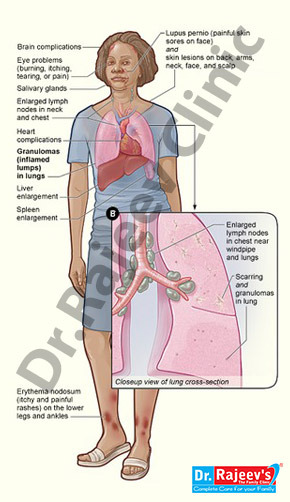

Sarcoidosis is a disease characterized by the growth of tiny collections of inflammatory cells (granulomas) in any part of body most commonly the lungs and lymph nodes. But it can also affect the eyes, skin, heart and other organs.
The cause of sarcoidosis is unknown, but experts think it results from the bodies immune system responding to an unknown substance. Some research suggests that infectious agents, chemicals, dust and a potential abnormal reaction to the bodies own proteins (self-proteins) could be responsible for the formation of granulomas in people who are genetically predisposed.
Signs and symptoms of sarcoidosis vary depending on which organs are affected. Sarcoidosis sometimes develops gradually and produces symptoms that last for years. Other times,symptoms appear suddenly and then disappear just as quickly. Many people with sarcoidosis have no symptoms, so the disease may be discovered only when a chest X-ray is done for another reason.
Sarcoidosis can begin with these signs and symptoms:
Sarcoidosis most often affects the lungs and may cause lung problems, such as:
Sarcoidosis may cause skin problems, which may include:
Sarcoidosis can affect the eyes without causing any symptoms, so it's important to have eyes checked regularly. When eye signs and symptoms do occur, they may include:
Signs and symptoms related to cardiac sarcoidosis may include:
Sarcoidosis can also affect calcium metabolism, the nervous system, the liver and spleen, muscles, bones and joints, the kidneys, lymph nodes, or any other organ.
Exact cause of sarcoidosis is unknown.Some people appear to have a genetic predisposition to develop the disease, which may be triggered by bacteria, viruses, dust or chemicals.
This triggers an overreaction of immune system, and immune cells begin to collect in a pattern of inflammation called granulomas. As granulomas build up in an organ, the function of that organ can be affected.
While anyone can develop sarcoidosis, factors that may increase risk include:

Sometimes sarcoidosis causes long-term problems.
ARSENIC IOD : Useful for sarcoidosis in the cases of chronic inflammatory states of the lungs and bronchial tubes with profuse, greenish-yellow and pus like expectoration. Useful when it is associated with shortness of breath, dry itchy skin and scrofulous opthalmia.
IODIUM : Best suited medicine to thin, dark complex individuals with enlarged lymph nodes. Also useful for acute catarrh of mucous membranes.There is violent lacrymation from eyes and foul ulcers in the mouth.
TUBERCULINUM : Useful for sarcoidosis where cause of the arising symptoms are still unknown. Suited to persons of light complexion with slim, flat narrow chest.
BRYONIA ALBA : Useful for sarcoidosis in cases where serous membranes and lungs are affected.Very useful in affections of respiratory system.
RHUSTOX : Very effective for sarcoidosis when prescribed on the basis of respiratory and skin symptoms.There is itchy reddish eruptions, swollen glands and dry teasing cough.
LYCOPODIUM : Useful for sarcoidosis where symptoms arises symptoms of right side of the body part.
RL 32